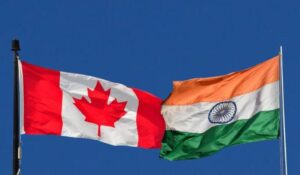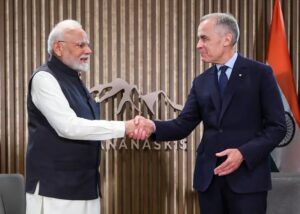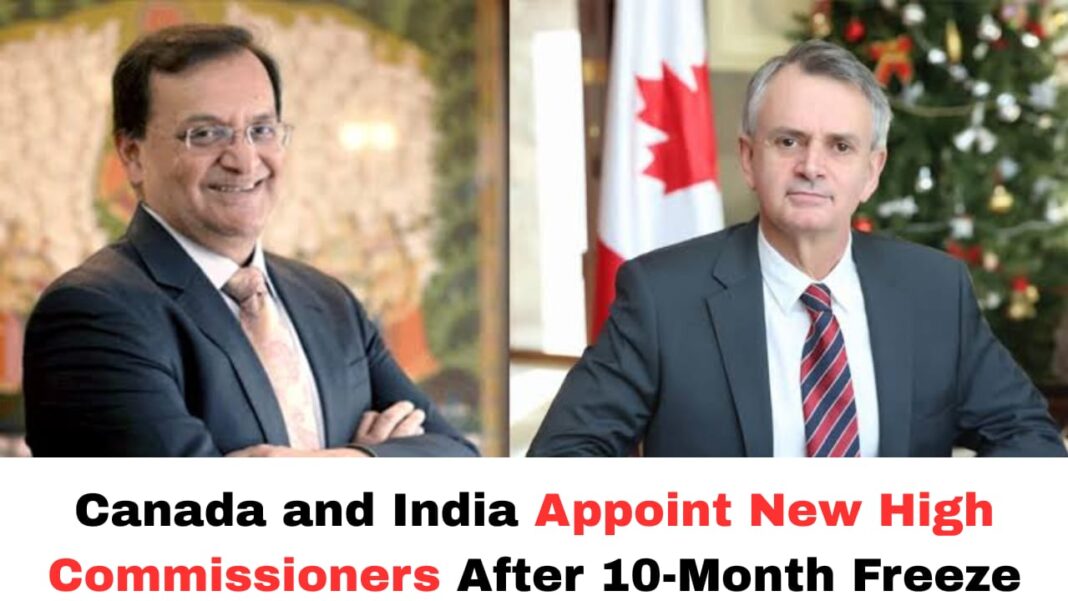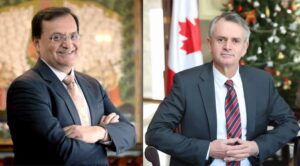Digital News Guru National Desk:
Canada and India Mend Diplomatic Ties: A New Chapter Begins
After a 10-month diplomatic rupture, Canada and India have reinstated high-level diplomatic representation—appointing Christopher Cooter as Canada’s High Commissioner to India and Dinesh K. Patnaik as India’s High Commissioner to Canada. This marks a significant thaw in bilateral relations following a series of high-stakes tensions.

The Rift: What Went Wrong?
The diplomatic fallout began with the assassination of Sikh separatist leader Hardeep Singh Nijjar near Vancouver in June 2023. Ottawa connected the killing to alleged actions by Indian government agents—a charge India vehemently denied, rationalizing the claims as “absurd and politically motivated.”
The standoff escalated quickly: India withdrew its High Commissioner, Sanjay Verma, and other diplomats; Canada reciprocated by expelling Indian diplomats and labeling some as “persons of interest.” Diplomatic ties deteriorated sharply, including the closure of visa and consular services.
The Thaw Begins: Modi and Carney Reset Relations
A turning point came in June 2025 at the G7 summit in Kananaskis, Alberta, where Indian Prime Minister Narendra Modi and Canadian Prime Minister Mark Carney agreed to “calibrated and constructive” steps to resolve the diplomatic impasse. Talks included reviving trade discussions, reinstating high commissioners, and improving visa services.
They also discussed cooperation in areas like clean energy, technology, digital transformation, and supply chains—reflecting ambitions to re-anchor the relationship in shared economic and strategic interests.

New Appointments: Diplomatic Reset in Motion
On August 28–29, 2025, both nations officially named their new high commissioners:
- Christopher Cooter, a veteran diplomat with postings in New Delhi (in the late 1990s), Israel, South Africa, and across Africa, is taking up Canada’s envoy role in India.
- Dinesh K. Patnaik, a seasoned Indian Foreign Service officer currently serving as Ambassador to Spain, will soon lead India’s mission in Ottawa.
Reactions:
- Canadian Foreign Minister Anita Anand described the move as a “step-by-step approach to deepening diplomatic engagement and advancing bilateral cooperation.”
- Indian officials similarly framed Patnaik’s appointment as a key gesture toward normalization.
Why It Matters: What’s at Stake
- Strengthening Diplomatic Engagement
With envoys restored, both countries can resume robust diplomatic channels, including visa services, trade promotion, and consular support for people-to-people exchanges. - Trade and Economic Opportunities
Trade ties—particularly the stalled Early Progress Trade Agreement (EPTA) and future Comprehensive Economic Partnership (CEPA)—can be revived, helping both economies reinvest in a win-win agenda. - Mutual Strategic Interests
Canada—seeking diversification beyond U.S. alliances—and India—prioritizing broader international partnerships—stand to benefit from renewed engagement on areas like clean energy, digital infrastructure, and critical minerals. - Symbolism of Thaw
The appointment of high commissioners after mass expulsions is a clear signal that both sides wish to move past the crisis. The “step-by-step” framing emphasizes caution and gradual progress.
Looking Ahead: What to Watch
- Envoy Effectiveness: Will Christopher Cooter and Dinesh Patnaik be able to rebuild trust and deliver tangible progress?
- Diplomatic Pipeline: Will trade negotiations resume effectively, potentially culminating in a CEPA agreement?
- Unresolved Flashpoints: The Nijjar case and concerns over Khalistani activism still linger—both need careful handling to avoid renewed fallout.
- Strategic Cooperation: Scope for coordination in shared global challenges—like climate change, technology standards, and transnational security.
Following a 10-month diplomatic freeze, Canada and India have appointed new high commissioners—Christopher Cooter to India, and Dinesh Patnaik to Canada—signaling restoration of relations.
Summary Table
| Aspect | Details |
| Cause of Rift | Nijjar killing allegations; mutual diplomatic expulsions. |
| Turning Point | Modi–Carney meeting at G7 Summit in June 2025. |
| New Envoys | Christopher Cooter (Canada → India); Dinesh K. Patnaik (India → Canada). |
| Strategic Significance | Enables trade talks, restores services, fosters cooperation. |
| Potential Challenges | Khalistani activism, unresolved legal investigations, mutual trust. |
You May Also Read: UPITS 2025: Uttar Pradesh Unveils Next-Generation Global Trade Showcase









